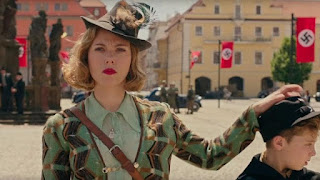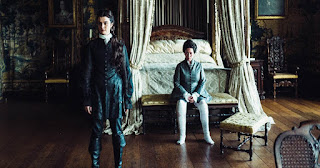Joker (2019)
[Reader disclaimer: there will be spoilers discussed. This piece also contains material of a sensitive nature].
Out of all of the Best Picture nominees for the 92nd Academy Awards season, I think I might be right in saying that Joker (2019) has received some of the biggest and controversial opinions from film-goers (with the exception of Jojo Rabbit (2019), of course). The film provides a new take on DC's iconic villain, depicting a man named Arthur (Joaquin Phoenix) who is essentially a struggling stand-up comedian with a neurological disorder that causes him to laugh uncontrollably, experience delusions and has difficulties with social interaction.
I'll begin with what I found to be the good parts of this film. Firstly, if we look at technicalities alone, it looks and sounds wonderful. The cinematography, the camerawork, the musical score (maybe with the exception of Gary Glitter's song in the third act): they all equate to a very unique and distressing experience. I cannot fault it on that front.
 |
| Credit: @themadimay_ |
Secondly, there are some representations of neurodiversity that don't rock the boat in terms of being harmful stereotypes. For example, the establishment of isolation that Joker experiences ("the other guys don't feel comfortable around you") and the inability to relate to people (demonstrated by a scene in which Joker observes the behaviours and social cues of people around him in his local comedy club) are very reminiscent of things that mentally ill people experience on a daily basis. We become sympathetic to this character's frustrations because we as individuals are shown a reflection of our own experiences, whether we are neurodiverse or not.
However, Joker is (in this writer's opinion) a harmful film for representing mental illness in the way that it does. I will preface this by saying I am neurodiverse, therefore I am going to have a more biased say on this film: the things I take issue with are representations that will undoubtedly result in how others may treat me in the future.
The entire premise of Joker is founded on this idea that a mentally unhinged man is pushed too far by the unforgivably cruel, neurotypical-driven society that surrounds him, and so he consequently has a psychotic break that leads him to murder five people within the film's runtime, beginning with three, middle-class boys that had begun beating him on a subway.
Within the context of this scene, it's a grey area as to whether or not Joker is valid in his actions. The first two men are killed in self-defence, which can be justified, however he murders the third after running from the scene and begging to be spared. Joker then flees the crime scene and dances in a dingy, public bathroom, as if to suggest that his actions are all a performance to him and not as serious as the audience will make it out to be. In this sequence, it feels as if the film is saying that not only is a mentally ill person more capable of or inevitable in killing someone but it portrays Joker as a man who lacks empathy, contradicting earlier scenes in which we see his close relationship with his mother and his need to be liked by those around him.
I have seen reviewers online claiming that this turning point is "haunting" or a "masterful depiction of mental illness" when, in reality, it's a blatant fetishization of a criminally insane man who has chosen to take the lives of other people (whether they deserve it or not) because he's fed up of being the bottom of the barrel. Now, as a neurodiverse person, I can agree with that sentiment: in the UK right now, funding to mental health services are being cut left and right (something also shown in Joker), and of course that's frustrating. However, that doesn't mean we're going to go out with a pistol and shoot people in the face for it. Demonstrating the flaws of the system in the film might be a realistic representation of our current society but to show it in a way that suggests that violence is the answer, or that there's no hope for the people affected by it, is irresponsible on the filmmakers' behalf.
 |
| Credit: @cigarettesenate |
Another justification that the film tries to slap on you is that Joker's mother, Penny (Frances Conroy) is revealed to also be mentally ill, suffering from severe delusions and having a past of physically abusing and neglecting her son as a child. It is also revealed that Penny is not his biological mother and that she has been in Arkham Asylum numerous times. In this sense, it's almost as if Joker is suggesting that victims of child abuse are exempt from scrutiny, even if they commit heinous crimes like murder, when really a backstory like this should only provide context, not a means to his madness.
Finally, there is the climactic scene in the third act, wherein Joker attends a talk show (one which has laughed at his expense previously for his seemingly terrible stand-up material) and proudly announces that he is the one that murdered the three men on the subway, which has inadvertently started a revolution in Gotham (ironic, really, considering that Joker is the poster boy for an uprising that he doesn't even care about; "I don't believe in any of that").
The show's host, Murray (Robert De Niro) argues with him in a heated debate, with Joker claiming that society treats neurodiverse people poorly and then ends the segment with the joke "what do you get when you cross a mentally ill loner with a society that abandons him and treats him like trash? You get what you fucking deserve!" and murders Murray live on air.
This is arguably the most poignant scene of the entire movie but it is also the most harmful. This entire interaction suggests that Murray's death is justified because of Joker's experiences, which it is not. Mentally ill people are not going to turn on neurotypicals and murder them because of how they've been treated; it is shown in many case studies that substance abuse largely has a direct correlation with most homicides and that mentally ill people are far more at risk to themselves than others. And to depict a division between these two types of people, to suggest that neurodiverse people are an 'Other', is enforcing this societal idea that we are different or "made wrong", or that without medication, we are more enlightened than everybody else.
I've said it once and I'll say it again: showing mentally ill people in cinema, ones with a predilection for murder, is not high art. It does nothing but portray harmful stereotypes of real people with real issues who are trying their best to navigate through a world that still sees their struggles as a taboo topic and are subjected to discrimination on the daily due to misinformation and unrealistic representation in the media (see Split (2017) for a 101 of how not to depict people with BPD).
 |
| Credit: @catholicdad420 |
In a way, Joker largely tackles important issues, such as neurodiversity being shunned, capitalism and materialism being a basis for class division and kindness being integral to societal harmony. However, it does not tackle these issues in a healthy way. And I believe this is the true essence of Joker: feigning intellect but being unable to deliver it in a tangible and respectful way. As Jeremy Scott said in his recent review of Joker, "it's one of the most well-made movies I ever hated".
Overall rating: 6/10
- K
[Editor's note: Thank you all so much for being patient with me! I know I haven't posted content in a few months and that was down to personal/financial issues that I'm currently working through. I always appreciate my readership and feedback. See you again next week, hopefully!]
























